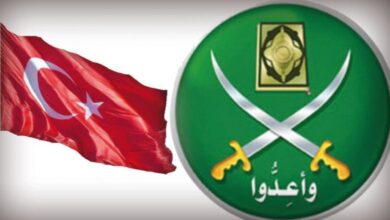For His Own Interests.. How Does the Turkish President Manage His Country’s Foreign Alliances?

In light of the serious challenges surrounding Turkey’s upcoming elections and the country’s troubled economy, Turkish President Recep Tayyip Erdoğan occasionally turns to various parties, including Gulf States and Russia, to find a way out of the economic impasse and ensure that he remains in power in the 2023 elections, on which he builds his foreign alliances.
Nordic Monitor published an article refuting Erdogan’s foreign-alliance-building policies, as he has already turned to Russia for help in increasing cash reserves, rehabilitating his broken image and providing relief to consumers through deep cuts in energy prices.
This was evident in his conversation with journalists on his way back from his recent tour in the Balkans. Erdogan revealed that negotiations are ongoing with Russian President Vladimir Putin regarding a discount on the price of natural gas, while Russia did not impose any sanctions on Turkey. Erdogan spoke with him about the price of gas shipments, he told reporters.
According to the Nordic Monitor website, Erdogan’s popularity has plummeted in Turkey, and the ruling Justice and Development Party (AKP) has lost significant support according to opinion polls, mainly due to rising inflation, high unemployment, especially among young people, and rising food and energy prices.
His priority is to prevent Russia from cutting off gas supplies to Turkey, as Putin has done to Europe, and more importantly to obtain concessions from Moscow at a reduced price as Moscow looks for ways to overcome Western sanctions.
The article considered that the Turkish President’s public statements during a trip to Bosnia, Serbia, and Croatia, in which he stood with Putin on cutting off gas from Europe, opposed sanctions, and accused the West of provoking Russia, were partly aimed at pleasing Putin prior to the Uzbekistan talks and about helping him win re-election in Turkey.
Erdogan has already announced that his government will not join sanctions on Russia and open Turkey’s financial and banking systems to Russian oligarchs who wanted to escape Western sanctions and avoid asset freezes and confiscations.
In his comments on the plane, Erdogan said that some companies had already stopped their money in Turkey because he claimed, “No trust in any other country. But there is confidence in Turkey at this point. My colleagues and I have been having a lot of meetings on this subject, and we have had positive results because of these meetings,” he said, boasting that the Turkish Central Bank’s foreign exchange reserves had improved in recent weeks and attributing the trend to the cash flow to Turkey.
Erdogan has a track record on such tactics that can speak for himself. For years, his government helped the Iranian regime bypass U.S. sanctions, as Turkish state banks laundered money for Iranian entities.
Meanwhile, he and his associates enriched themselves from the bribes and kickbacks they received from these operations, and a 2013 graft investigation revealed that Erdogan and his associates received a significant amount of bribes from an Iranian agent, Reza Darab, who laundered Iranian government funds using Turkey’s Halk Bank to evade U.S. sanctions.
The same investigations also showed that Erdogan’s son Bilal secretly took money from former al-Qaeda financier Yasin al-Qadi, a close friend of the Turkish president, even though the judge had at one time been designated a terror financier by the United States and the United Nations, and not only the financial and economic benefits Erdogan sought from Putin’s Russia but also political support during the 2023 elections.
More importantly, he is seeking Russian leverage in Turkey, where over the years Moscow has built up a huge network of influence operations, and many Turkish critics and experts, including former generals, often appear on Turkish debate platforms to repeat Moscow’s talking points while offering their support to the Erdogan government.
The pro-Kremlin Russian media outlet Sputnik has a Turkish edition, and its coverage has been very pro-Erdogan in recent years. Although Europe has barred Russian media outlets such as RT and Sputnik on the grounds that they engaged in “continuous and coordinated propaganda actions targeting the EU and neighboring members of civil society, distorting facts and seriously manipulating facts,” Erdogan’s government has allowed them to continue broadcasting in Turkey.
According to former intelligence officer Enor Altaili, who has studied Russia for decades and believes that Russia has imperialist goals, with Turkey being one of Moscow’s goals, the negative views of the Turkish public toward the United States, the West, and NATO during the Russian-Ukrainian war should be attributed to the intelligence activities of Russian intelligence, which spent large amounts of money to make Turkey pro-Russian and anti-Western.
After the latest polls, almost half of the Turkish public believe that Russia is not responsible for the bloodshed in Ukraine, and this stance proves one thing: this Russian intelligence fund is run very successfully in Turkey, and anyone who manages the Turkish part of this fund should be given a medal by Russia!.
In fact, according to a June survey by Ankara-based Metropol that it cited, about 48 percent of Turks blame the United States and NATO, of which Turkey has been a member since 1952, for the Russian invasion of Ukraine, while only 34 percent believe Russia was responsible.












